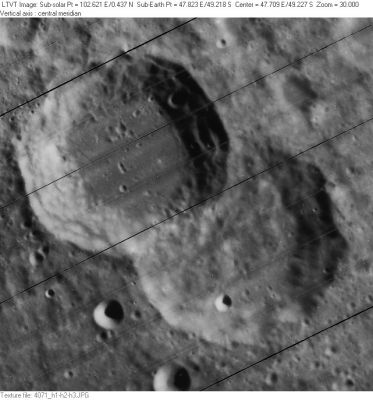Difference between revisions of "Steinheil"
(Created page with "<div id="content_view" class="wiki" style="display: block"> =Steinheil (of the pair Steinheil / Watt)= {| class="wiki_table" | Lat: 48.6°S, Long: 46.5°E, Diam: 67 km, De...") |
|||
| (3 intermediate revisions by the same user not shown) | |||
| Line 3: | Line 3: | ||
{| class="wiki_table" | {| class="wiki_table" | ||
| | | | ||
| − | Lat: 48.6°S, Long: 46.5°E, Diam: 67 km, Depth: 5.57 km, [ | + | Lat: 48.6°S, Long: 46.5°E, Diam: 67 km, Depth: 5.57 km, [[R%C3%BCkl%2076|Rükl: 76]], Nectarian<br /> |
|} | |} | ||
<div id="toc"> | <div id="toc"> | ||
| − | + | [http://www.lpod.org/coppermine/displayimage.php?pid=2621&fullsize=1 [[Image:Normal_Steinheil-Watt_LO-IV-071H_LTVT.JPG|external image normal_Steinheil-Watt_LO-IV-071H_LTVT.JPG]]]<br /> ''[http://lpod.org/coppermine/displayimage.php?pos=-2621 LO-IV-071H]'' '''Steinheil''' is the crater in the upper left, overlaying similarly-sized [[Watt|Watt]] (to its southeast). The sharp-shadowed 6-km circle of '''[[Watt|Watt]] B''' can be seen on the south floor of [[Watt|Watt]], with 10-km '''[[Watt|Watt]] A''' and 12-km '''[[Watt|Watt]] B''' beyond it (outside the rim). In the upper left corner of this view are 17-km '''Steinheil X''' and 16-km '''Steinheil Y''' (only partially visible).<br /> <br /> | |
| − | |||
==Images== | ==Images== | ||
[http://www.lpod.org/coppermine/thumbnails.php?album=search&type=full&search=Steinheil LPOD Photo Gallery] [http://www.lpi.usra.edu/resources/lunar_orbiter/bin/srch_nam.shtml?Steinheil%7C0 Lunar Orbiter Images] [http://www.lpi.usra.edu/resources/apollo/search/feature/?feature=Steinheil Apollo Images]<br /> <br /> | [http://www.lpod.org/coppermine/thumbnails.php?album=search&type=full&search=Steinheil LPOD Photo Gallery] [http://www.lpi.usra.edu/resources/lunar_orbiter/bin/srch_nam.shtml?Steinheil%7C0 Lunar Orbiter Images] [http://www.lpi.usra.edu/resources/apollo/search/feature/?feature=Steinheil Apollo Images]<br /> <br /> | ||
==Maps== | ==Maps== | ||
| − | ''([ | + | ''([[LAC%20zone|LAC zone]] 128A1)'' [http://planetarynames.wr.usgs.gov/images/Lunar/lac_128.pdf USGS Digital Atlas PDF]<br /> <br /> |
==Description== | ==Description== | ||
<br /> | <br /> | ||
==Description: Elger== | ==Description: Elger== | ||
| − | ''([ | + | ''([[IAU%20directions|IAU Directions]])'' STEINHEIL.--A double ring-plain, E. of [[Janssen|Janssen]], 27 miles in diameter. The more westerly formation sinks to a depth of nearly 12,000 feet below the summit of the border.<br /> <br /> |
==Description: Wikipedia== | ==Description: Wikipedia== | ||
[http://en.wikipedia.org/wiki/Steinheil_(crater) Steinheil]<br /> <br /> | [http://en.wikipedia.org/wiki/Steinheil_(crater) Steinheil]<br /> <br /> | ||
==Additional Information== | ==Additional Information== | ||
| − | Depth data from [ | + | Depth data from [[Kurt%20Fisher%20Crater%20Depths|Kurt Fisher database]]<br /> |
* Westfall, 2000: 5.57 km | * Westfall, 2000: 5.57 km | ||
* Viscardy, 1985: 3 km | * Viscardy, 1985: 3 km | ||
| Line 27: | Line 26: | ||
* [http://en.wikipedia.org/wiki/Carl_August_von_Steinheil Carl August von Steinheil] (October 12, 1801 – September 14, 1870) was a German astronomer and physicist. He founded the optical-astronomical company ''C.A. Steinheil und Söhne'' to build telescopes, spectroscopes and photometers (his invention, used to measure brightness). In 1852 he added refractors and reflectors with silver-covered mirrors to the production. | * [http://en.wikipedia.org/wiki/Carl_August_von_Steinheil Carl August von Steinheil] (October 12, 1801 – September 14, 1870) was a German astronomer and physicist. He founded the optical-astronomical company ''C.A. Steinheil und Söhne'' to build telescopes, spectroscopes and photometers (his invention, used to measure brightness). In 1852 he added refractors and reflectors with silver-covered mirrors to the production. | ||
| − | * ''[ | + | * ''[[Whitaker|Whitaker]]'' (p. 200) notes that the combination of '''Steinheil''' and [[Watt|Watt]] was labeled '''Zamosci''' on [[Langrenus|van Langren]]'s 1645 map. Whitaker does not explain where the name '''Steinheil''' came from, but evidently in Elger's day the entire structure was known by that name. The name [[Watt|Watt]], for the eastern part, was apparently introduced by [[Schmidt|Schmidt]] (''[[Whitaker|Whitaker]]'', p. 224). <span class="membersnap">- Jim Mosher</span> |
<br /> | <br /> | ||
==LPOD Articles== | ==LPOD Articles== | ||
| − | [http:// | + | [http://www2.lpod.org/wiki/January_18,_2006 Unequal Twins]<br /> <br /> |
==Bibliography== | ==Bibliography== | ||
<br /> <br /> | <br /> <br /> | ||
---- | ---- | ||
| − | + | </div> | |
Latest revision as of 02:18, 16 April 2018
Contents
Steinheil (of the pair Steinheil / Watt)
|
Lat: 48.6°S, Long: 46.5°E, Diam: 67 km, Depth: 5.57 km, Rükl: 76, Nectarian |
LO-IV-071H Steinheil is the crater in the upper left, overlaying similarly-sized Watt (to its southeast). The sharp-shadowed 6-km circle of Watt B can be seen on the south floor of Watt, with 10-km Watt A and 12-km Watt B beyond it (outside the rim). In the upper left corner of this view are 17-km Steinheil X and 16-km Steinheil Y (only partially visible).
Images
LPOD Photo Gallery Lunar Orbiter Images Apollo Images
Maps
(LAC zone 128A1) USGS Digital Atlas PDF
Description
Description: Elger
(IAU Directions) STEINHEIL.--A double ring-plain, E. of Janssen, 27 miles in diameter. The more westerly formation sinks to a depth of nearly 12,000 feet below the summit of the border.
Description: Wikipedia
Additional Information
Depth data from Kurt Fisher database
- Westfall, 2000: 5.57 km
- Viscardy, 1985: 3 km
- Cherrington, 1969: 2.1 km
Nomenclature
- Carl August von Steinheil (October 12, 1801 – September 14, 1870) was a German astronomer and physicist. He founded the optical-astronomical company C.A. Steinheil und Söhne to build telescopes, spectroscopes and photometers (his invention, used to measure brightness). In 1852 he added refractors and reflectors with silver-covered mirrors to the production.
- Whitaker (p. 200) notes that the combination of Steinheil and Watt was labeled Zamosci on van Langren's 1645 map. Whitaker does not explain where the name Steinheil came from, but evidently in Elger's day the entire structure was known by that name. The name Watt, for the eastern part, was apparently introduced by Schmidt (Whitaker, p. 224). - Jim Mosher
LPOD Articles
Bibliography
